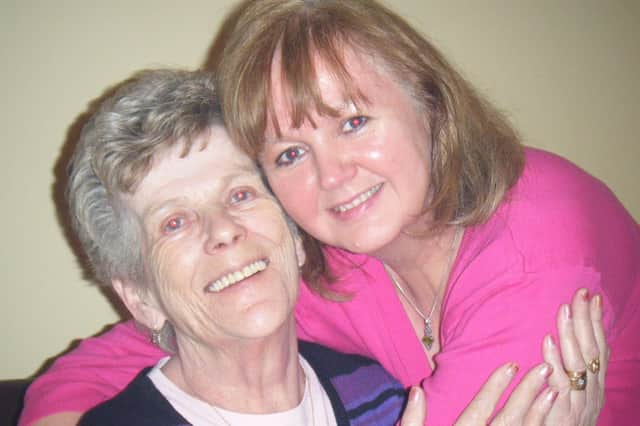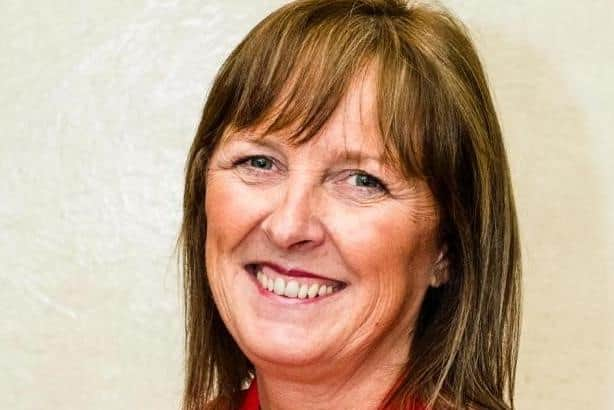Alzheimer’s Society vows to advocate for a fairer deal for carers of those with dementia


Alzheimer’s Society is urging people caring for a loved one with dementia in Northern Ireland to get in touch if they have questions about the support and benefits they are entitled to.
The charity estimates this silent group of 1.8 million unpaid carers save the UK economy £13.9 billion a year, including £350 million in Northern Ireland, but says many are unaware of where to turn to for help.
Advertisement
Hide AdAdvertisement
Hide AdSince the pandemic began, over six million people have accessed the charity’s services, including Dementia Connect. This vital support has been a real lifeline for thousands during the crisis but they want to reach more people affected by dementia. Its team of dedicated Dementia Advisers, help the partners, family members and friends caring for loved ones to navigate the complicated maze of health and social care services.


Marie Ward from Londonderry helped to care for her Mum Elizabeth Diamond for a number of years, before she sadly passed away in February 2020.
Marie, who retired as assistant director of Human Resources in the Western Health and Social Care Trust earlier this year, said the first signs of Elizabeth’s Alzheimer’s disease began to show around seven years ago when she began to get forgetful about dates. It became progressively more serious as the years went by and, as her family were to learn, the condition affects more than just a person’s memory.
Marie said: “She was just an amazing mum. She always put me first and family was everything. She cared for me and my kids her whole life, looking after them too when they were younger to allow me to go to work and was so kind, decent, caring and funny.
Advertisement
Hide AdAdvertisement
Hide Ad“Mum lived independently with my Dad James in her bungalow in Kilfennan. However, over a number of years this horrible disease took everything away from the person I loved.
“I have to admit I used to think that Alzheimer’s was memory loss and how wrong I was. In the early stages Mum would forget dates and words and recall of short-term events. She would repeat her stories quite a lot. Then it progressed to difficulty in piecing together what she wanted to say or to follow others in conversation, she lost the ability to cook and needed more and more care.
“However, she could remember events from a long time ago when she was younger. We then experienced the mood swings, sometimes irritation over the slightest things and sometimes she would become withdrawn. In the end there were times when she couldn’t remember eating.
“Food was unfamiliar to her and she would have difficulty swallowing but worst of all were her repeating pleas for help.”
Advertisement
Hide AdAdvertisement
Hide AdSadly, Marie’s Dad and Elizabeth’s husband, James Diamond, passed away in May 2019 aged 81. Some months later, Elizabeth was taken into hospital after suffering a fall at home, and after a further fall in the hospital her health deteriorated to the point where she could not return home and was instead placed in a care home.
Following her Mum’s death Marie decided she wanted to raise money for Alzheimer’s Society who provide help and support to people living with dementia and their loved ones.
“I am currently doing ‘79 walks for Dementia’ because that was the age my mum was when she died, so it’s one walk for each year of her life,” she explained.
Marie set herself the challenge of raising £3,000 and has already smashed that target, raising just over £5,000 to date. The money will help fund Alzheimer’s Society services including the Dementia Connect support line (0333 150 3456) where a team of dedicated Dementia Advisers help the partners, family members and friends caring for loved ones to navigate the complicated maze of health and social care services.
Advertisement
Hide AdAdvertisement
Hide Ad“I would encourage carers who need support, whether it’s advice on legal documents, help understanding dementia, or someone to talk to when things get tough, to contact the Dementia Connect support line,” said Marie.
There are 22,000 people in Northern Ireland living with dementia. Alzheimer’s Society argues that decades of under-funding has led to a system that is difficult to access, costly, inadequate and unfair. And it says the UK Government’s spending plans announced as part of last month’s budget was a missed opportunity to bring about meaningful change at a time when Covid has exposed the dire state of our social care system.
It had called for an additional £3.9 billion a year to be allocated to adult social care, but the Government’s plans will deliver less than £1 billion a year, which the charity described as ‘a real-terms spending cut’.
Ahead of the draft multi-year budget for Northern Ireland which is expected to be launched by Finance Minister Conor Murphy before Christmas, Alzheimer’s Society is calling on the Executive to put people affected by dementia at the heart of their social care plans by using the new social care funding towards the implementation of the Regional Dementia Care Pathway. And the charity will continue its calls to make dementia a standalone priority in the Department of Health’s ongoing reform of social care.
Advertisement
Hide AdAdvertisement
Hide AdBernadine McCrory, country director for Alzhiemer’s Society in Northern Ireland said: “Without family carers our health economy would completely fall apart and it is already close to that. What we call ‘informal’ or family carers save our health service so much money every year. Unless we support those carers properly, financially, emotionally and with respite time, then they are not going to be able to continue the vital work that they do that then eases pressure on our social care system.
“Over a third of people who died with Covid since the start of the pandemic had dementia as an underlying condition. And many of those carers are aged people as well, so the less that we support them we will end up in a dire state.
“The benefits that are available to carers currently are not at all proportionate when you consider the kind of round-the-clock work that carer’s actually do.”
Bernadine added: “I think carers need to have a much more prominent voice in public discourse, but because they are so consumed with looking after their loved one, they don’t always have the time to do this and this is where Alzheimer’s Society hopes to advocate on their behalf. We pledge to be advocates both for carers and those with dementia where we can. It doesn’t always mean that we can cure the problem, but it does go some way to ensuring that their voices are heard more clearly and that their needs are flagged on a governmental and societal level.
Advertisement
Hide AdAdvertisement
Hide Ad“I would like to see much more upstream investment in social care because then we would have fewer crisis admissions to hospital, we would have fewer instances of ill-health, fewer delayed discharges from hospital, fewer breakdowns among carers and less inappropriate admissions to residential care.
“As a wider society we need to do all we can to build more caring communities that look after people who are vulnerable and support people with dementia and their carers so that they can stay at home for as long as possible before going into residential care. People with dementia want to remain in their homes for longer because that is where they feel comfortable and that helps them to retain memory, especially if they have family around them.”
The Alzheimer’s Society is asking people to join the campaign ‘Cure the Care System’ which will give people the opportunity to tell their local MLA about the importance of improving the lot of carers, those with dementia and the social care system.
To join the campaignvisit alzheimers.org.uk/curethecaresystem.
Comment Guidelines
National World encourages reader discussion on our stories. User feedback, insights and back-and-forth exchanges add a rich layer of context to reporting. Please review our Community Guidelines before commenting.